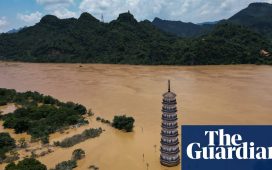NIIGATA, Japan – The finance chiefs of the Group of Seven (G-7) bloc of wealthy industrialised nations will discuss on Friday ways to beef up resilience in supply chains, so that developing countries can wean off their reliance on China for critical products.
Their three-day meeting in Niigata, a coastal city in central Japan, will come to a close on Saturday. It is a prelude to the G-7 Leaders’ Summit in Hiroshima from May 19 to 21, where China is again expected to be the elephant in the room.
G-7 foreign ministers had, in their meeting in April, called on China to “act as a responsible member of the international community” and “abstain from threats, coercion, intimidation, or the use of force”.
In Niigata on Thursday, United States Treasury Secretary Janet Yellen said the G-7’s top priority was to mitigate geostrategic risks and counter China’s purported use of “economic coercion” to assert its dominance.
The G-7 comprises Britain, Canada, France, Germany, Italy, Japan and the US. The European Union is a “non-enumerated” member without right to the rotating presidency.
On Friday afternoon, G-7 finance chiefs and central bank governors will host a rare outreach session with six invited nations – Brazil, Comoros, India, Indonesia, Singapore and South Korea.
Singapore is represented in Niigata by Deputy Prime Minister and Finance Minister Lawrence Wong, who said in a Facebook post on Thursday that he will discuss with his counterparts “ways to strengthen economic and financial cooperation between emerging markets and developed economies”.
Other issues on the meeting agenda on Friday include ways to safeguard financial stability from bank runs. Three regional US lenders – Silicon Valley Bank, Signature Bank and First Republic Bank – have collapsed since March.
“Financial worries can spread instantaneously via social networking platforms, while digital banking that allows money withdrawals outside business hours can cause bank runs,” Japanese Finance Minister Shunichi Suzuki said on Thursday.
Central bank governor Kazuo Ueda said there was no serious impact from the volatility on Japan’s banks, adding that calm has returned to the global financial system.
The G-7 finance chiefs are also set to discuss topics such as climate change and the debt trap among developing countries.
This comes as Japan, under its G-7 presidency in 2023, prioritises the rebuilding of multilateralism with low- and mid-income nations in the so-called Global South, emphasising the need to protect an international rules-based order.
On Thursday, the G-7 finance chiefs discussed the ongoing Russian invasion of Ukraine, seeking to bolster the bloc’s sanctions regime against Moscow to push the Kremlin to end the war.














